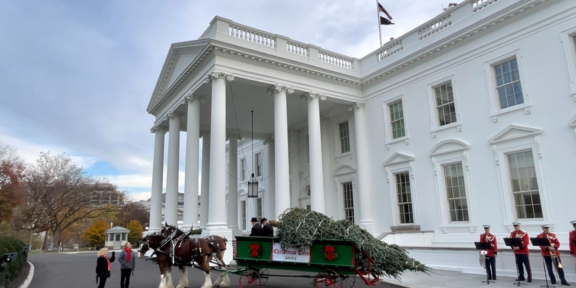Thousands Gather for 50th Anniversary March, Museum Opening
Fifty years ago, on Feb. 1, 1960, four North Carolina A&T students took a stand against segregation by sitting down at a F.W. Woolworth store counter. This simple act by four freshmen, now known as the A&T Four or the Greensboro Four, inspired students in North Carolina — and around the country.
Today, thousands of people came back to the very place where it all began to honor them and to commemorate the opening of the International Civil Rights Center & Museum. At noon, they will retrace the activitists’ steps by marching from the campus to the museum, which officially opened this morning in the Woolworth building.
One of the four, Franklin E. McCain, looks at the museum opening as a challenge to himself and the next generation.
“The opening of the museum to me personally means a challenge,” McCain said in an interview with the Howard University News Service. “It reminds me of what happened on Feb. 1st and presents me with the question ‘what have I done lately?’
“The museum is like a report card for me,” he explained. “I do a little self-introspection and give myself a grade. The grade I come back with is a C. I have to recognize that I cannot live on Feb. 1st for the rest of my life. I have to continue to do other great things. That’s what I have been doing.”
He was one of the two survivors among the Greensboro Four who are participating int the five-day series of events, including a breakfast this morning and luncheon on Friday honoring the sit-in activists. Snow forced the cancellation of Saturday and Sunday events, including the 50th anniversary gala and an ecumenical service.
McCain, who still resides in the Greensboro area, worked for 35 years at the Celanese Corp. in Charlotte, N.C. Now retired, with a wife, Bettye Davis, and three sons, McCain still remains an oral historian for the events that happened that day.
Jibreel Khazan (Ezell Blair Jr.) now works with the developmentally challenged in New Bedford, Mass., while Joseph McNeil joined the Air Force and later retired from the Federal Aviation Administration. David Richmond died on Dec. 7, 1990.
Although the Greensboro sit-ins might have started with four young men, the impact it had across the country encompassed tens of thousands.
When the four arrived at Woolworth on the second day of the sit-in, national and local reporters had gathered at the store. The media attention helped to take make the local protest a national one.
Students from A&T, Bennett College and even three white students from Greensboro Women’s College descended upon the Woolworth store to participate in the non-violent sit-in.
As the news spread, students at other colleges in 40 other cities around the country began engaging in their own protests.
In the span of six days, the number of people participating in the Woolworth sit-ins grew from four to more than 1,000.
According to 69-year-old Howard Patterson, the infamous Greensboro Four was almost the Greensboro Five.
“They passed me that Monday going down to demonstrate,” reminisced Patterson. “They said ‘come on Pat,’ and I said ‘y’all go ahead, I have to go to class.’ I missed that first day but I got involved the next day and stayed involved until May of 1963. When I look back now, I feel kind of bad because I could have been No. 5.”
The weekend-long commemorative activities began on Thursday with a town hall that drew more than 500 people to A&T’s Alumni Events Center to hear panelists such as Rev. Jesse Jackson, Bennett College President Julianne Malveaux, A&T Chancellor Harold L. Martin Sr. and Benjamin F. Chavis Jr., one of the Wilmington 10 and now president of the Hip-Hop Summit Action Network.
The following day, a luncheon honored the Greensboro Four and 16 other unsung heroes who played a major role in the civil rights efforts in Greensboro. Later that night, A&T student playwright Kevin Wilson staged his play, “Mississippi Mourning: The Emmett Till Story,’ in the Harrison Auditorium.
Here is today’s schedule:
5:30 a.m. | Sit-in Anniversary Breakfast and
6:30 a.m. | Sit-In Program & Human Rights Medal Award
Empire Ballroom – Downtown Greensboro
8 a.m. | International Civil Rights Center & Museum Ribbon Cutting Ceremony
8 a.m. to 9:30 a.m. | People’s Breakfast, A&T Williams Cafeteria
10 a.m. to 11:15 a.m. |”The Role of Bennett Women in the Sit-Ins,” Pfeiffer Chapel
11 a.m. | Adornment of the A&T Four
Buildings & Laying of the Wreath
A&T Aggie Village
11:30 a.m. | Burying of the Time Capsule
A&T February One Monument
12 p.m. | Commemorative March
A&T February One Monument
Visit HUNewsService.com for ongoing updates on the commemoration.






